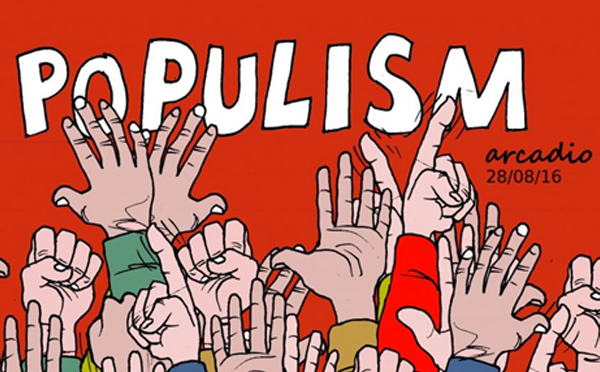Populism
Posted on : February 25, 2020Author : AGA Admin

Populism, political program or movement that champions the common person, usually by favourable contrast with an elite. Populism usually combines elements of the left and the right, opposing large business and financial interests but also frequently being hostile to established socialist and labour parties. The term populism can designate either democratic or authoritarian movements. Populism is typically critical of political representation and anything that mediates the relation between the people and their leader or government. In its most democratic form, populism seeks to defend the interest and maximize the power of ordinary citizens, through reform rather than revolution. In its contemporary understanding, however, populism is most often associated with an authoritarian form of politics. Populist politics, following this definition, revolves around a charismatic leader who appeals to and claims to embody the will of the people in order to consolidate his own power. In this personalized form of politics, political parties lose their importance, and elections serve to confirm the leader’s authority rather than to reflect the different allegiances of the people. In the second half of the 20th century, populism came to be identified with the political style and program of Latin American leaders such as Juan Perón, Getúlio Vargas, and Hugo Chávez. Populist is often used pejoratively to criticize a politician for pandering to a people’s fear and enthusiasm. Depending on one’s view of populism, a populist economic program can therefore signify either a platform that promotes the interest of common citizens and the country as a whole or a platform that seeks to redistribute wealth to gain popularity, without regard to the consequences for the country such as inflation or debt.
Storms of My Grandchildren

Storms of My Grandchildren: The Truth About the Coming Climate Catastrophe and Our Last Chance to Save Humanity is climate scientist James Hansen‘s first book, published by Bloomsbury Press in 2009. The book is about threats to people and habitability for life on earth from global warming. In the book, Hansen describes how the burning of fossil fuels is changing our climate and argues that this is putting Earth into imminent peril. He suggests that millions of species, and humanity itself, are threatened. The title of the book, Storms of My Grandchildren, refers to the ferocious and stormy weather events that will occur in the next generation if fossil fuel use continues in the way it has.In Hansen’s evaluation, the response of politicians to this crisis has mainly been “greenwashing“, where their proposals sound good but amount to little Hansen says that we immediately need to cut back atmospheric carbon dioxide emissions such that atmospheric concentrations are stabilized at 350 ppm or less, in order to avoid environmental disasters for generations to come. He advocates prompt phaseout of coal plant emissions, plus improved forestry and agricultural practices.Hansen supports a carbon tax returned to citizens as a dividend and rejects cap and trade.] He also supports nuclear power and rejects geoengineering.




